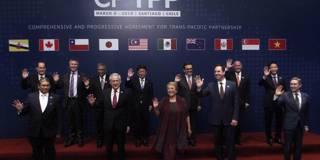With the United States disengaging from Asia and China threatening to dominate the region, Asia’s democracies must assert their common interests more strongly. Although they have made a good start by liberalizing trade, building a thriving Asian multilateral order will require a much greater economic, political, and social commitment.
SEOUL – After World War II, Asia emerged from years of conflict and centuries of colonialism. The United States quickly became the main guarantor of regional security, signing bilateral defense treaties and establishing preferential trade and investment relationships with its Asian allies – in particular the Philippines, Australia, Japan, South Korea, and Pakistan. In the decades since, Asia has reaped substantial development gains from open trade, investment, and multilateral cooperation, enabling the region to become a leading global trade hub.

SEOUL – After World War II, Asia emerged from years of conflict and centuries of colonialism. The United States quickly became the main guarantor of regional security, signing bilateral defense treaties and establishing preferential trade and investment relationships with its Asian allies – in particular the Philippines, Australia, Japan, South Korea, and Pakistan. In the decades since, Asia has reaped substantial development gains from open trade, investment, and multilateral cooperation, enabling the region to become a leading global trade hub.